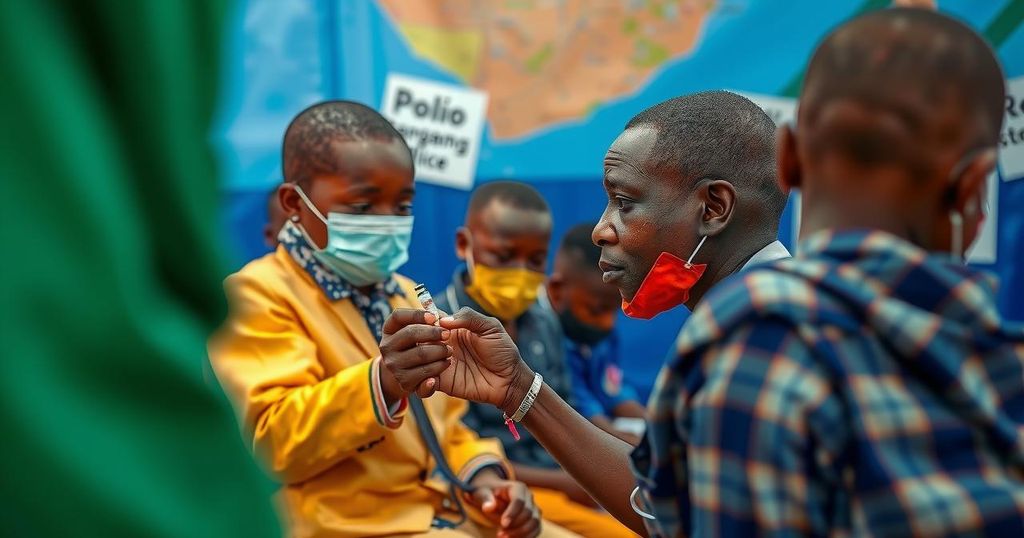Lifestyle
AFRICA, BUNGOMA DISTRICT, CHARLES NJUGUNA, DANIEL KYABAYINZE, DISEASE OUTBREAK, DISEASE OUTBREAKS, GPEI, HEALTH, HUMANITARIAN, HUMANITARIAN AID, KAMPALA, KENYA, MBALE DISTRICT, MINISTRY OF HEALTH OF, MINISTRY OF HEALTH OF UGANDA, NAIROBI, TRAVEL ADVISORY, UGANDA, WHO, WORLD HEALTH ORGANIZATION
Daniel O'Connor
0 Comments
Kenya and Uganda Achieve Milestone in Polio Vaccination Efforts, Reaching 6.5 Million Children
From October 3 to 6, 2024, Kenya and Uganda conducted a synchronized polio vaccination campaign that vaccinated over 6.5 million children, focusing on high-risk cross-border regions. The joint effort was a response to recent poliovirus detections and emphasized the need for regional cooperation in preventing disease transmission. Health officials highlighted the importance of immunization in protecting vulnerable populations against polio.
From October 3 to 6, 2024, a remarkable synchronized polio vaccination campaign successfully vaccinated over 6.5 million children across Kenya and Uganda. The initiative commenced with coordinated launches in Bungoma District, Kenya, and Mbale District, Uganda, effectively reaching high-risk cross-border areas. By aligning vaccination efforts, both countries aimed to lessen the risk of poliovirus transmission between their borders, following recent detections of the virus in both nations. This joint campaign represents a pivotal response to recent polio outbreaks, with six strains identified in Kenya and one in Uganda in 2024. Health authorities emphasized that protecting children from polio is of utmost priority, particularly as both nations recognize that no child should be vulnerable due to their geographic location. Dr. Daniel Kyabayinze, the Director of Public Health in Uganda, expressed gratitude for partnerships in achieving a polio-free future and underscored the importance of door-to-door vaccinations. The initiative involved strategic planning, focusing on mapping cross-border communities, migratory routes, and key transit points for effective vaccine delivery. Dr. Charles Njuguna from the World Health Organization stressed the urgency of vaccination efforts, especially as the virus spreads rapidly among children under five. Additionally, Charles Korir, the Global Polio Eradication Initiative Coordinator in Kenya, praised the synchronized vaccination efforts and their supportive role in combating the current polio outbreak fueled by population movements. This collaborative vaccination strategy aligns with broader global health goals and aims to close immunization gaps, particularly among “zero-dose” children who have never been vaccinated. The synchronized efforts reflect a commitment to regional cooperation in public health, highlighting that the fight against polio transcends national borders. By prioritizing community health in border areas, Kenya and Uganda are exemplifying how cooperative actions can lead to significant public health advancements.
Polio, a highly infectious viral disease, poses a significant health risk, particularly to children. The recent outbreaks in Kenya and Uganda underline the critical need for coordinated vaccination efforts, especially in areas where population movement is high due to trade or migration. Vaccination is a proven method for preventing the disease and ensuring public health safety across borders, making regional cooperation essential in addressing health challenges that affect multiple nations. This synchronized polio campaign reflects a broader strategy to eliminate the disease from high-risk populations in East Africa, demonstrating the importance of comprehensive vaccination efforts that prioritize vulnerable groups.
In conclusion, the synchronized polio vaccination campaign between Kenya and Uganda demonstrates a successful model of health collaboration aimed at eradicating polio. By vaccinating over 6.5 million children, both nations have significantly reduced the risk of poliovirus transmission. The initiative reflects a commitment to public health that transcends national borders, emphasizing the importance of global cooperation in eradicating diseases. As these countries continue to work together, their efforts may pave the way for a polio-free future, setting a precedent for other nations facing similar challenges.
Original Source: www.afro.who.int




Post Comment